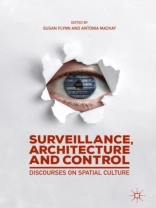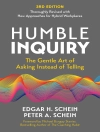This edited collection examines the culture of surveillance as it is expressed in the built environment. Expanding on discussions from previous collections;
Spaces of Surveillance: States and Selves (2017) and
Surveillance, Race, Culture (2018), this book seeks to explore instances of surveillance within and around specific architectural entities, both historical and fictitious, buildings with specific social purposes and those existing in fiction, film, photography, performance and art. Providing new readings of, and expanding on Foucault’s work on the panopticon, these essays examine the role of surveillance via disparate fields of enquiry, such as the humanities, social sciences, technological studies, design and environmental disciplines.
Surveillance, Architecture and Control seeks to engender new debates about the nature of the surveilled environment through detailed analyses of architectural structures and spaces; examining how cultural, geographical and built space buttress and produce power relations. The various essays address the ongoing fascination with contemporary notions of surveillance and control.
Table des matières
1. Introduction, Susan Flynn and Antonia Mackay.- Section 1: Urban Landscapes and Spatial Surveillance.- 2. Exercising Control at the Urban Scale: Towards a Theory of Spatial Organisation and Surveillance, Alan Reeve.- 3. Staying Awake in the Psychetecture of the City: Surveillance, Architecture, and Control in
Miracleman and
Mister X, Kwasu D. Tembo.- 4. Surveillance and Spatial Performativity in the Scenography of
Tower, Lucy Thornett.- Section 2: Domestic Architecture and Houses of Horror.- 5. Houses, Homes and the Horrors of a Suburban Identity Politic, Jaclyn Meloche.- 6. One Grey Wall and One Grey Tower: The Bates World in Alfred Hitchcock’s
Psycho, Subarna Mondal.- 7. Architecture and
American Horror Story: Reading ’Murder House’ on Murderous Bodies, Antonia Mackay.- 8. Surveillance, Sousveillance and the Uncanny Domestic Architecture of
Black Mirror, Luke Reid.- Section 3: International Spaces, Performativity and Identity.- 9.
The Birds: Public Art and a Narrative of Surveillance, Joel Hawkes.- 10. Ireland’s Magdalene Laundries and the Psychological Architecture of Surveillance, Jennifer O’Mahoney, Lorraine Bowman Grieve, and Alison Torn.- 11. Performing the Repentant Lover in the Courtroom: An Analysis of Oscar Pistorius’ Recreation of Hegemonic Masculinity, Alexandra Macht.- Section 4: Technological Cultures of Surveillance.- 12. In the Drone-Space: Surveillance, Spatial Processing, and the Videogame as Architectural Problem, Nathaniel Zetter.- 13. Sensurround: 4D Theatre Space and the Pliable Body, Stacy M. Jameson.- 14. Surveillance and Spectacle inside
The Circle, Brian Jarvis.- 15. Wayfinding
re/dicto, Graydon Wetzler. 16. Epilogue: Control(ling) Space, Susan Flynn and Antonia Mackay.
A propos de l’auteur
Susan Flynn is a lecturer at the University of the Arts, London, UK. She specialises in visual culture, digital media, identity and equality studies.
Antonia Mackay is a lecturer at Oxford Brookes University, UK. She specialises in American literature and culture, twentieth and twenty-first century literature and cultural and media studies.












